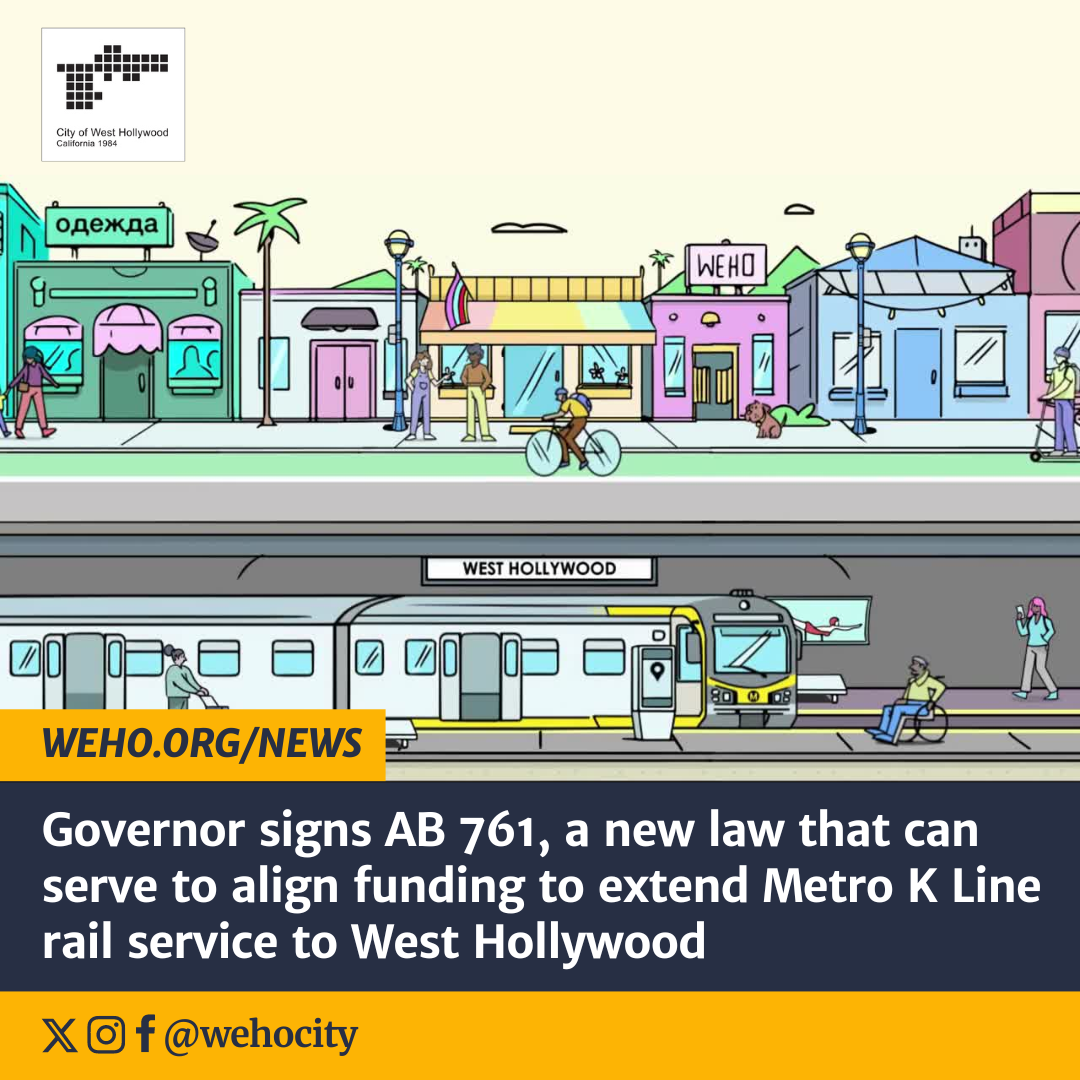 The City of West Hollywood applauds California Governor Gavin Newsom for signing AB 761 by Assemblymember Laura Friedman (D-44th District) – Local Finance: Enhanced Infrastructure Financing Districts – which extends the life of Enhanced Financing Infrastructure Districts (EIFDs) to 75 years from the current maximum term of 45 years. This extended period aligns with the repayment terms of federal Transportation Infrastructure Finance and Innovation Act (TIFIA) loans. Such loans can serve as a vital source of capital to fund the local portion of the Metro K Line Extension to accelerate construction and bring Metro rail service to West Hollywood sooner than the originally projected date of 2041.
The City of West Hollywood applauds California Governor Gavin Newsom for signing AB 761 by Assemblymember Laura Friedman (D-44th District) – Local Finance: Enhanced Infrastructure Financing Districts – which extends the life of Enhanced Financing Infrastructure Districts (EIFDs) to 75 years from the current maximum term of 45 years. This extended period aligns with the repayment terms of federal Transportation Infrastructure Finance and Innovation Act (TIFIA) loans. Such loans can serve as a vital source of capital to fund the local portion of the Metro K Line Extension to accelerate construction and bring Metro rail service to West Hollywood sooner than the originally projected date of 2041.
The City of West Hollywood, in partnership Los Angeles County Supervisor Lindsey P. Horvath, Third District, worked with Assemblymember Friedman to introduce the legislation, which is now law.
“Signing AB 761 is a huge step forward in creating funding pathways to extend Metro’s K Line to West Hollywood, Mid City, and Hollywood and making Metro rail service a reality for our community,” said City of West Hollywood Mayor John M. Erickson. “West Hollywood residents overwhelmingly support bringing Metro rail to WeHo and we’re grateful to Assemblymember Friedman, Supervisor Horvath, and Governor Newsom, among many who are helping us to create sustainable transit options for our community members and our region at large.”
The City of West Hollywood has been pursuing an EIFD as a central element of planning for the Metro K Line Northern Extension light rail project (formerly the Crenshaw/LAX Line). For several years, the City of West Hollywood has been advancing this key project in collaboration with Metro, the City of Los Angeles, and the County of Los Angeles. After years of analysis, Metro is now nearing completion of their Environmental Impact Report (EIR) and passage of AB 761 is one of the many elements that will get the City closer to realizing such a transformative project for improving mobility on the Westside and enhancing the connectivity of the entire Metro network.
EIFDs are a type of tax increment financing district cities and counties could form to help fund economic development projects. To leverage long-term property tax increment revenue through an EIFD, which is slow to ramp up for upfront investment, the City could use a TIFIA loan, which is more generous under the new federal “Infrastructure Investment and Jobs Act” (IIJA) and allows longer maximum terms (up to 75 years). Extending the terms of EIFDs from 45 to 75 years to be consistent with TIFIA loan terms will reduce annual payments for local agencies, increase the financing capacity of EIFDs, and make EIFDs more viable as a funding tool for jurisdictions pursuing critical transit capital investments.
The new law will benefit not only the K Line Northern Extension, but also other LA Metro rail projects by providing local governments with a new fiscal tool to support planned rail infrastructure projects in their communities. LA Metro is in the middle of one of the largest transit expansions in the nation. Though most projects are funded by Los Angeles County’s Measure R or M sales taxes and State or Federal grants, rising project costs are increasingly limiting the pace of that expansion, meaning more support from local cities and counties will be needed to keep projects and climate goals on schedule.
Learn more about the future northern extension of the Metro K Line by visiting www.weho.org/metro.
For more information, please contact Hernán Molina, the City of West Hollywood’s Governmental Affairs Liaison, at (323) 848-6364 or at hmolina@weho.org. For people who are Deaf or hard of hearing, please call TTY (323) 848-6496.
For up-to-date information about City of West Hollywood news and events, follow @wehocity on social media, sign-up for news updates at www.weho.org/email, and visit the City’s calendar of meetings and events at www.weho.org/calendar. West Hollywood City Hall is open for walk-in services at public counters or by appointment by visiting www.weho.org/appointments. City Hall services are accessible by phone at (323) 848-6400 and via website at www.weho.org. Receive text updates by texting “WeHo” to (323) 848-5000.
For reporters and members of the media seeking additional information about the City of West Hollywood, please contact the City of West Hollywood’s Public Information Officer, Sheri A. Lunn, at (323) 848-6391 or slunn@weho.org.